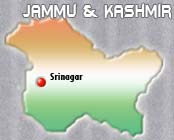Kashmiri Nadrus are in high demand during Ramadan
 Srinagar, Sep. 29 : These days the Kashmir valley is witnessing a high demand for Nadru, the lotus stem, as during the holy month of Ramadan most of the devout Muslims, who remain on dawn to dusk fasts, relish it a lot.
Srinagar, Sep. 29 : These days the Kashmir valley is witnessing a high demand for Nadru, the lotus stem, as during the holy month of Ramadan most of the devout Muslims, who remain on dawn to dusk fasts, relish it a lot.
Kashmiri Nadru (lotus stem), which are found beneath the water of Dal Lake and the Walur Lake, attract huge demand during this ongoing holy month.
Bland in taste with a texture somewhere between that of a potato and Sinagara(water chestnut), Nadru is rich in dietary fiber and vitamin C, among other nutrients, as well as low in fat.
Dal Lake is described to be home to vast stretches of lotus plants. Lotus flowers, it is said, not only balance the wetland ecosystem, but also lend an attraction value to the beauty of the lake.
Mostly Dal lake dwellers collect Nadru. To collect it they have to stay in water for over six to eight hours and go four to five feet deep under the water holding the leaf of a Nadru to cut it from the roots.
Local residents and tourists throng the markets in large numbers to buy fresh Nadrus.
"Nadru is sold during Eid and Ramadan. We enjoy collecting them. They are also bought by the tourists," said Nisar Ali, a Nadru collector.
"Nadru is best in Kashmir. A number of people come here to purchase it," said Shafi Akhoon, another Nadru Collector.
For many local residents, Nadru ensures livelihood for nine months. They sell them to vegetable vendors.
A bundle of Nadru is sold for rupees 150 to 250 depending on its size. The total revenue generated by Nadru is estimated to be about 350 million rupees.
"We collect these every nine months. This is good business. We earn about 150 rupees by selling a bundle of Nadru," said Farooq Ahmed, Nadru Collector.
The demand for Nadru increases on Hindus’ Shivratri festival as well.
Floating vegetable vendors are a prime tourist attraction in the valley. The main market is of Nadrus and roots, otherwise too, witnesses a good demand throughout the year. (ANI)